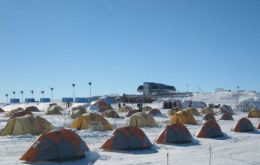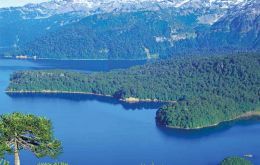MercoPress. South Atlantic News Agency
Environment
-
Sunday, January 22nd 2012 - 05:29 UTC
EU shipping safety review to take full account of Costa Concordia sinking

A review of EU passenger ship safety rules is being stepped up following the Costa Concordia shipwreck off the Italian coast. Europe’s transport Commissioner Siim Kallas announced Friday that the review, which began in 2010, must take full account of the circumstances surrounding the sinking of the cruise vessel Costa Concordia in shallow water a week ago.
-
Sunday, January 22nd 2012 - 05:07 UTC
US and Russia joint team to inspect all foreign installations in Antarctica

United States and the Russian Federation will send a joint team to inspect foreign stations, installations and equipment in Antarctica from January 23 to January 28, 2012. The inspection will be conducted pursuant to the Antarctic Treaty of 1959 and its Environmental Protocol.
-
Friday, January 20th 2012 - 15:24 UTC
Global average temperature in 2011 the ninth warmest in modern records

The global average temperature in 2011 was the ninth-warmest in the modern meteorological record, continuing a trend linked to greenhouse gases that saw nine of the 10 hottest years occurring since the year 2000, NASA scientists said this week.
-
Friday, January 20th 2012 - 08:01 UTC
Bill for the BP oil spill in the Gulf of Mexico could reach 20/25 billion dollars

British Petroleum is likely to agree to pay the US Department of Justice 20 to 25 billion dollars to settle all charges around the Gulf of Mexico oil spill, according to a leading analyst, a prediction that is at least twice what the company has set aside.
-
Tuesday, January 17th 2012 - 06:38 UTC
Volcanic ashes again isolate Argentine ski and summer resort causing massive losses

The presence of a cloud of ash caused by a volcano in Chile has again closed an airport in neighbouring Argentina just days after it had re-opened anticipating massive losses for the tourism and the resort’s finances.
-
Tuesday, January 17th 2012 - 06:35 UTC
Australian experts link carbon dioxide emissions effects on fish brain and nervous system

Rising human carbon dioxide emissions may be affecting the brains and central nervous systems of sea fish, with serious consequences for their survival, according to Australian research.
-
Friday, January 13th 2012 - 22:37 UTC
Brazil's orange juice threatened by the discovery of the fungicide carbendazim

Orange-juice futures rebounded from the biggest two-day slump since 2008 on renewed concern that a US government probe of imports from Brazil will tighten supplies. The Food and Drug Administration said it will detain all imports that contain carbendazim, a fungicide that isn’t approved for oranges in the US.
-
Friday, January 13th 2012 - 21:02 UTC
Trade of illegal pesticides booming in Europe under control of organized crime

The trade of illegal and counterfeit pesticides is proliferating in Europe reports Europol. The exceptional ‘low risk – high profit’ margin, combined with the lack of harmonisation in legislation and implementation, make this a fast growing area of organised crime.
-
Wednesday, January 11th 2012 - 06:30 UTC
Argentine farm leader says Agriculture minister is not qualified and knows little about droughts

An Argentine farmers’ leader said that Agriculture Minister Norberto Yauhar who tried to downplay the seriousness of the current drought for crops, “is not qualified for the job, plus knows very little about droughts”.
-
Wednesday, January 11th 2012 - 06:24 UTC
Chilean Patagonia in the 2012 top ten travel destinations of the New York Times

Chile has been included in the New York Times’ list of top travel destinations in 2012, with Chilean Patagonia in 8th place, and Chiloé in 37th place out of a total of 45.
